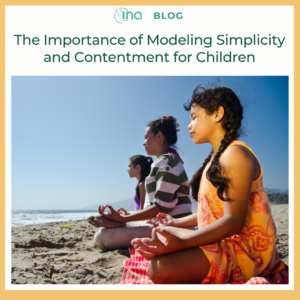
Our lives can easily get cluttered, and before we know it, we’re bogged down and trying to clear away the ‘extra’ in our lives. Whether it’s too many things accumulating around your home, or cluttered thoughts that lead to anxiety, it is important to keep simplicity at the core. This is especially true in a world where we are all – kids, teens and adults alike – are bombarded with ads for the next latest and greatest toy, device, or gadget.
Simplicity is at its very essence, is a life that is less cluttered and focused on things that are simple and easy to understand. Simplicity isn’t usually fancy; it’s usually plain and natural. Simplicity goes hand in hand with contentment.
So, how do we model simplicity and contentment for the young people in our lives? Here are some tips.
#1: Show them what healthy choices and boundaries are.
Living the simple life can be healthier because there is less stress. Less stress translates to better physical, mental, emotional, and spiritual health. So, make healthy choices and set boundaries that don’t overextend your body or mind. Your kids see what you do, what you stress over, and how you create healthy balances. So, be sure to show them what those good decisions look like and the benefits of those choices.
#2: Model your values and priorities.
Living a life of simplicity allows us to focus on what’s important. It frees us up to do the things that bring us the most joy, and to help us give back to others. For example, if you talk about generosity or the importance of helping others, show kids what that looks like. That might mean buying a toy for someone else in need rather than adding another toy to your child’s room. Or, if you want to model the importance of family time versus screen time, put your phone away and find an activity that allows you to simply play or explore together – without screens.
#3: Be generous.
When your children see you giving freely to others, they learn that there’s beauty in simplicity and it’s not important to be defined by what you have. So, give generously to those around you. Maybe it’s doing random acts of kindness, making a meal for someone recovering from surgery, or purchasing food or clothing for a local organization that helps those less fortunate.
#4: Demonstrate contentment.
Our kids are sponges in many ways – they soak up what we say, how we respond, and what we do. Be content with the things in your life – food, transportation, relationships, and our possessions. For example, when we go about our daily lives, talk about being grateful for the things that we often take for granted like our vehicles or the snacks we munch on. Even the smallest things are big blessings and we should always remind our children of that. Doing so creates a thankful heart – even for the simplest things in life.
By celebrating the gifts you already have in your life and modeling your values with action is how we can best teach simplicity.
